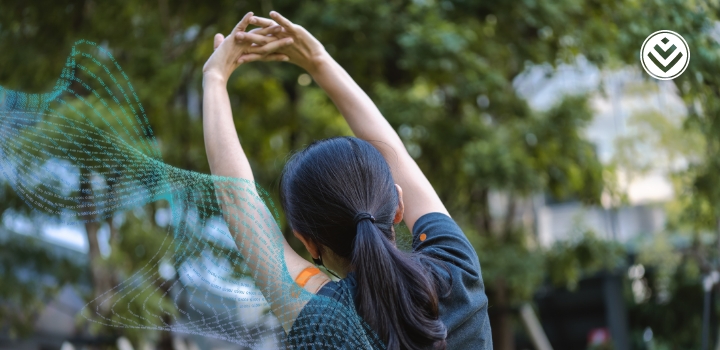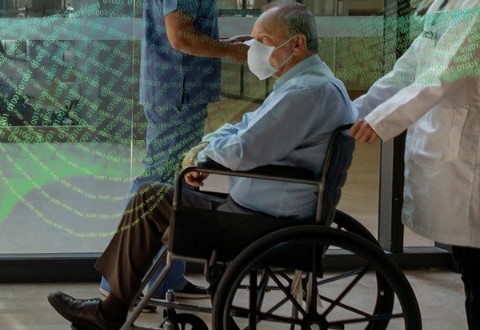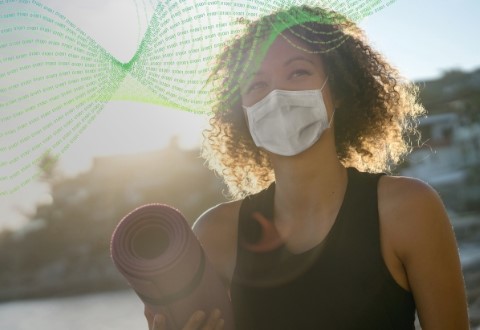British Journal of Sports Medicine publication: COVID-19 vaccine effectiveness significantly higher in people who exercise regularly

The British Journal of Sports Medicine (BJSM) has published Discovery Health's new research (which has been carried out in collaboration with leading South African scientists). We show that regular physical activity acts as a possible adjuvant (enhancer) to the immune-boosting effect of COVID-19 vaccines, reducing severe outcomes in vaccinated people (hospital admissions).
What did we set out to investigate and what did we find?
We looked at whether varying vaccine effectiveness was observed among sub-populations of South African healthcare workers with directly measured low, moderate, and high physical activity levels. This effectiveness related to the single dose Ad26.COV2.S or Janssen/Johnson & Johnson COVID-19 vaccine.
This study was carried out in collaboration with leading South African scientists (acknowledged below).
Our findings suggest a possible dose-response where high levels of physical activity are associated with higher vaccine effectiveness.
Why look at the association between vaccine effectiveness and physical activity levels?
Discovery Health is South Africa's largest private health insurance administrator, providing comprehensive healthcare insurance to more than 3.7 million people in South Africa. Discovery Health therefore has extensive access to claims and private health system utilisation data and is uniquely positioned to generate at-scale real-world insights into the impact of COVID-19 and related areas.
Over the past two years, our Health Intelligence team has had the privilege of working with leading local scientists on a number of research projects on this front. Some of this work has been published internationally and relates to COVID-19 vaccine effectiveness in various contexts:
- 2 September 2021: The South African Medical Journal: The impact of routine pulse oximetry use on outcomes in COVID-19-infected patients at increased risk of severe disease: A retrospective cohort analysis
- Our related article.
- 29 December 2021: New England Journal of Medicine: Effectiveness of BNT162b2 Vaccine against Omicron Variant in South Africa
- Our related article and update.
- Our related Media Release.
- 10 February 2022: British Journal of Sports Medicine: Small steps, strong shield: directly measured, moderate physical activity in 65 361 adults is associated with significant protective effects from severe COVID-19 outcomes
- Our related article.
- 19 March 2022: The Lancet: Effectiveness of the Ad26.COV2.S vaccine in health-care workers in South Africa (the Sisonke study): results from a single-arm, open-label, phase 3B, implementation study
- Our related article.
- 9 June 2022: New England Journal of Medicine: Effectiveness of Ad26.COV2.S and BNT162b2 Vaccines against Omicron Variant in South Africa
- Our related article.
- 14 Sept 2022 New England Journal of Medicine: Effectiveness of Ad26.COV2.S and BNT162b2 Vaccines against Omicron Variant in South Africa
- Our related article.
Our interest in COVID-19 vaccine effectiveness is sustained in our latest research which has been published in the prestigious BJSM.
Our latest research turns to field of exercise immunology
This is a field which has enhanced understanding of how regular, moderate intensity physical activity improves immunosurveillance with many pronounced health benefits.
It's well-documented that both COVID-19 vaccination and taking part in regular physical activity, independently decrease the likelihood of severe COVID-19 infection.
Now, our new research outlines the association between heightened Johnson & Johnson single-dose COVID-19 vaccine effectiveness and physical activity levels. Ours is not the first study of this nature. Past studies that have measured antibody responses to determine vaccine efficacy (looking at vaccines like the flu vaccine) suggest that regular physical activity of moderate intensity enhances the protective effect of vaccines, especially in those with immune dysfunction including the elderly.
Our methodology
South Africa's COVID-19 vaccination drive kicked off with the prioritisation of healthcare workers for vaccination through the Sisonke trial or Sisonke study (not a clinical trial but an implementation science clinical trial, preceding and bolstering the national vaccination roll out). For this trial Johnson & Johnson donated 500 000 units of its single-dose COVID-19 vaccine (Ad26.COV2.S) to South Africa, to accelerate vaccination of frontline healthcare workers.
Between 17 February and 17 May 2021, 477 102 healthcare workers were enrolled and vaccinated.
To find out whether physical activity was an effect modifier on the relationship between vaccination and hospitalisation, we used a test negative case-control study design to estimate the risk of having an associated COVID-related hospital admission in a cohort of who weren't vaccinated and a cohort who were fully vaccinated.
1. Test negative case-control studies provide vaccine effectiveness estimates consistent with randomised control trials, provided that the data are adequately adjusted for confounders (such as age, sex, and co-morbidities) which influence the risk of the outcome being measured.
- We assessed the risk of serious COVID-19 at 28 days or more (at which point people were considered fully vaccinated) post a single vaccine dose, with a median follow up time since vaccination of 98 days
- This was a retrospective analysis using anonymised Discovery Health and Vitality client data from 16 February 2021 to 30 October 2021.
- Vitality is Discovery's global health promotion and behavioural change programme that encourages and rewards members for engaging in healthy lifestyle choices such as physical activity.
- 258 293 COVID-19 PCR test results for Discovery Health administered medical scheme members with membership during the study period were analysed.
- Vaccinated individuals were health-care workers who received vaccination in the Sisonke phase 3B study. Unvaccinated individuals included both non-healthcare workers and healthcare workers.
- COVID-19 PCR test results for vaccinated and unvaccinated individuals with physical activity logged were included.
- COVID-19 admission data were obtained from Discovery Health's pre-authorisation data records.
- Measured physical activity records were extracted from Vitality data. Minutes of physical activity, step count and heart rate data were obtained from Vitality clients' wearable device records. Participants physical activity was measured and activity type, frequency and duration were recorded.
- Study participants were divided into three measured physical activity subgroups - low, moderate and high activity levels, each sub-group containing vaccinated and unvaccinated individuals.
2. The physical activity subgroups were defined as follows (Vitality defines moderate intensity as having an average heart rate between 70% to 79% of maximum):
- Low activity levels (those engaging in less than 60 minutes of at least moderate intensity physical activity per week). In this group 94.2% were unvaccinated and 5% fully vaccinated.
- Moderate activity levels (those engaging in between 60 and 149 minutes of at least moderate intensity physical activity per week). In this group 93.8% were unvaccinated and 5.4% fully vaccinated.
- High activity levels (defined as engaging in more than 150 minutes of at least moderate intensity physical activity per week). In this group 92.4% were unvaccinated and 6.7% fully vaccinated.
Similar percentages of participants - 91.6%, 92.0% and 92.9% respectively across all three groups - had no documented prior COVID-19 infection. Most study participants were between the ages of 18 and 44.
Results
Over the study period, COVID-19 admissions per 1000 unvaccinated lives were:
- 23.2 in the low activity group
- 20 in the medium activity group
- 15.7 in the high activity group.
COVID-19 admissions per 1000 vaccinated lives were
- 10.4 in the low activity group
- 5.2 in the medium activity group
- 3.2 in the high activity group.
Among vaccinated healthcare workers vaccine effectiveness against a COVID-19-related admission was:
- In the low physical activity group - 60.0% (95% confidence interval [CI], 39.0 to 73.8)
- In the moderate physical activity group - 72.1% 26 (95% CI, 55.2 to 82.6)
- In the high physical activity group - 85.8% (95% CI, 74.1 - 92.2)
So, compared to individuals with low activity levels, vaccinated individuals who engaged in high and moderate activity levels had a 2.8 (95% CI 2.35-3.35) and 1.4 times (1.36-1.51) higher reduction of risk of COVID-19 admission respectively (p-value < 0.001 for both groups)
We performed three sensitivity analyses to confirm our findings.
- Read the study in full.
Discussion: The association between regular physical activity and the protective effect of vaccination against SARS-CoV-2 in a South African case-control study
We set out to test the hypothesis that regular physical activity acts as an adjuvant (enhancer) to the immune-boosting effect of COVID-19 vaccines, reducing severe outcomes in vaccinated people (measured by hospital admission).
"Healthcare workers who had a single J&J vaccine dose and who engaged in regular physical activity experienced improved vaccine effectiveness against COVID-related hospital admission. In fully vaccinated individuals' vaccine effectiveness against hospitalisation in those with high activity levels was 86% - significantly higher than the 60% effectiveness found for individuals with low activity levels," explains Discovery Health's Chief Healthcare analytics Actuary, Shirley Collie. "Higher levels of physical activity had a greater (2.8-fold) association with vaccine effectiveness."
- Why would we see this sort of effect?
"More research is needed to understand why exactly exercise enhances vaccination's effects," says Shirley. "For now, we suggest that the response may be a combination of enhanced antibody levels, improved T-cell* immunosurveillance and psychosocial factors. Many studies have shown that engaging in regular exercise increases our immunity overall and lowers our risk of community-acquired infections, and so could strengthen the effect of being vaccinated." Vaccination gives our immune system the opportunity to come in to contact with an inactivated form or portion of a pathogen before encountering the real pathogen, and so build up defences to it ahead of time.
- *T-cells that are part of the immune system and look for and recognise pathogens like bacteria or viruses, to help to protect the body from infection.
- Read the study in full to find out more about the possible explanations of our results.
Conclusion
The damaging medical consequences, and destructive economic and social ripple effects of the COVID-19 pandemic have been well described. Individuals' physical and mental health, behaviour and social security have been impacted.
As of October 2022, over 6.55 million people have died from COVID-19 disease worldwide. Many more (around 620 million people) have contracted the disease, some experiencing serious illness.
"In summary, our study shows that physical activity appears to enhance the protective effects of single-dose J&J COVID-19 vaccination against severe COVID-19," explains Shirley. "We therefore strongly recommend that physical activity should be encouraged by greater public health messaging, as a key method through which to lowering individual and population-wide risk of serious COVID-19 illness."
Non-pharmacological interventions to control the spread of COVID-19 have included lockdowns, which have also limited individual's ability to carry out or access physical activity. This new data adds to the mounting evidence supporting the protective effects of regular physical activity against adverse COVID-19 outcomes such as hospital and ICU admission, ventilation, and death.
Also, regular physical activity has many proven health benefits. In the context of protecting against severe outcomes from COVID-19, there is now evidence that physical activity may increase the effectiveness of COVID-19 vaccines.
These findings add to studies that highlight the protective effects of physical activity against COVID-19 infection and serious outcomes.
Importantly, this is the first study to use recent, directly measured physical activity data to demonstrate an association between increased levels of regular physical activity and effectiveness of vaccination against adverse COVID-19 outcomes.
Going forward:
"Recent studies point to waning vaccine effectiveness over time. We didn't look at this effect in the research we describe here, and it's something that can be considered for future research - which could also look at the effectiveness of a J&J COVID-19 vaccine booster dose - which is now a standard recommendation - and the association with physical activity levels," explains Shirley.
A note on this study's strengths and limitations
Strengths:
The large number of included individuals who were vaccinated, almost all having directly measured recordings of physical activity data as opposed to self-reported activity levels.
Limitations:
- Analysis is based on a select group - healthcare workers who are members of a private medical scheme and also of Vitality. They are likely of a higher socio-economic standing than the general insured and general population of South Africa. The results are therefore not generalisable.
- Correlated factors (possibly healthier diet, lower alcohol consumption and better sleeping patterns) may contribute to or explain the higher vaccine effectiveness observed amongst the highly active population relative to the population with low physical activity. We did not have access to this information on each study participant.
- We lack information on different types of physical activity (cardiovascular, strength, endurance training and so on) and the effect on vaccine effectiveness.
Study authors:
- Prof. Jonathan Patricios: Wits Sport and Health (WiSH), School of Clinical Medicine, Faculty of Health Sciences, University of the Witwatersrand and Department of Paediatrics and Child Health.
- Professor Glenda Gray, President of the South African Medical Research Council (SAMRC).
- Professor Linda-Gail Bekker, Director of the Desmond Tutu HIV Centre at the Institute of Infectious Disease and Molecular Medicine at University of Cape Town; and Chief Executive Officer for Desmond Tutu Health Foundation.
- Professor Ameena Goga: SAMRC, Unit Director of the SAMRC HIV Prevention Research Unit.
- Dr Nigel Garrett: Centre for the AIDS Programme of Research in South Africa (CAPRISA), Durban, South Africa and School of Nursing and Public Health, Discipline of Public Health Medicine, University of KwaZulu-Natal, Durban, South Africa
- Dr Robin Saggers: Wits Sport and Health (WiSH), School of Clinical Medicine, Faculty of Health Sciences, University of the Witwatersrand and Department of Paediatrics and Child Health, Charlotte Maxeke Johannesburg Academic Hospital and School of Clinical Medicine, Faculty of Health Sciences, University of the Witwatersrand
- Rosella Bandini: PRINCE: Project to Improve Neonatal Care, School of Clinical Medicine, Faculty of Health Sciences, University of the Witwatersrand
- Discovery Health's Shirley Collie (Chief Healthcare Analytics Actuary) and Lizelle Steenkamp (Senior Healthcare Statistician at Discovery Health) and Jared Champion (Senior Actuary at Discovery Health)
See the full publication for details of each contributing author's specific input into the study, and for the author-team's thanks in full.
Interested in knowing more or reporting on these findings?
Please contact us on MEDIA_RELATIONS_TEAM@discovery.co.za to request any updated data available since publication and to obtain any further context required.
Did you find this post interesting?
Read our related posts on:
a) The need for regular Pfizer COVID-19 vaccine booster shots to maintain effectiveness against serious COVID-19 illness caused by Omicron BA.1/2 and BA.4/5 (published in the New England Journal of Medicine) and;
b) Our February 2022 study, published in British Journal of Sports Medicine, showing that exercise protects against serious COVID-19 outcomes.
Disclaimer
All information shared on this page is based on perspectives gained from analysing data acquired by Discovery Ltd and its various affiliate entities (Discovery). The analysis, which is conducted by Discovery's actuarial and data science team, aims to encourage industry dialogue. Publications containing our analyses are shared for educational and informational purposes only. Each publication reflects only the data available for analysis at the time of publication. It does not, unless otherwise indicated, constitute peer-reviewed, published scientific research, and hence should not be interpreted as such or used as a basis for altering treatment decisions. While every effort has been made to ensure the accuracy of the content conveyed, we cannot be held liable or responsible for any actions or decisions taken based on the information shared in this article.

Deep dive: Admission rates across South Africa's four COVID-19 waves confirm Omicron-driven fourth wave's lower severity, and more.
07 July 2022
Authors: Chana Suttner (Actuary, Discovery Health),Michael Cohen (Actuarial Analyst, Discovery Health), Shirley Collie (Chief Healthcare Analytics Actuary, Discovery Health

Long COVID symptoms, impact on carrying out daily activities: Survey of just over 7,000 medical scheme members reveals key insights
16 June 2022
Authors: Shirley Collie (Chief Healthcare Analytics Actuary, Discovery Health), Lizelle Steenkamp (Senior Healthcare Statistician, Discovery Health), Lebohang Radebe (Data Scientist, Discovery Health), Dr Smybinn Mathews (Clinician, Discovery Health) and Dr Dave Jacobs (Senior Clinician and Clinical Classification System Architect, Discovery Health)

Discovery's COVID-19 personal resilience index predicts an individual's resilience to serious COVID-19 illness
23 May 2022
Authors: Lizelle Steenkamp (Senior Healthcare Statistician at Discovery Health), Tommy Chen (Actuary at Discovery Health), Jared Champion (Senior Actuary at Discovery Health) and Donald Ntjana (Senior Data Scientist at Discovery Health)